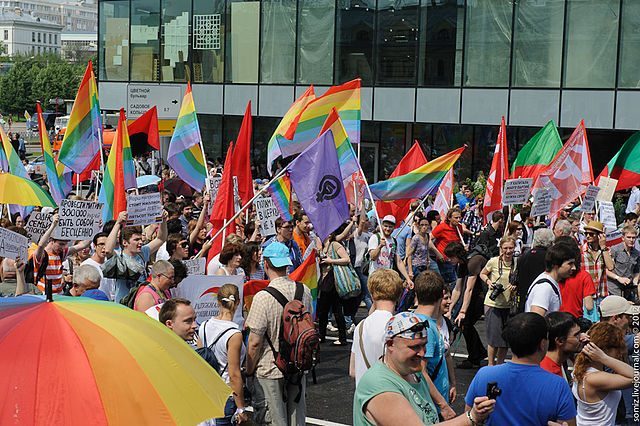Russia Declares the LGBTI Movement “Extremist”: International Support Urgently Needed

In a distressing development, Russia’s Supreme Court labelled the “international LGBT movement” as an “extremist organisation” on 30 November 2023. This move, consistent with Russia’s ongoing anti-gender policies, places trans and LGBI people at severe risk of criminal persecution and imprisonment. The continued work of Russian LGBTI organisations and activists is under threat. We call upon partners and decision-makers worldwide to support and protect trans and LGBI people and allies in Russia.
This move is neither the first nor likely the last one in Russia’s recent anti-trans and anti-gender policies. On 24 July 2023, a full ban on legal and medical transition was made law. A drastic violation of international human rights law, it leaves trans people without access to legal gender recognition or any gender-affirming healthcare. Moreover, it bans them from adopting children and makes it possible to annul their marriages.
In addition, MP Nikolaev, author of the law banning transition, has filed an enquiry with the General Prosecutor’s Office to investigate clinics that have issued medical certificates enabling trans people to change their gender marker. In his statement published on 20 November 2023, he accused trans organisations of tricking people into transitioning and announced a “crackdown on the transgender mafia.” His proposal includes a “psychiatric reassessment” of persons who changed their legal gender shortly before the anti-trans law came into effect.
Impact on the trans community
As a result of the transition ban, trans people in Russia and Russia-occupied parts of Ukraine are even more exposed to discrimination, violence, and increasing societal stigma. They are already suffering from a lack of access to healthcare—both trans-specific and non-trans-specific—with doctors denying services for fear of liability. The ban on adoption and marriage jeopardises families with trans members. The impact of all this on trans people’s mental health has been abysmal, with several reported cases of trans suicides. While even more trans people now seek emigration, poverty and visa restrictions create barriers that are unsurmountable for most.
The “extremism” ruling, although it has not yet taken effect, has already sparked disturbing acts of violence and discrimination: police raided several queer venues, and a digital mapping company started collecting data on LGBTIQ businesses. For trans and LGBI people or allies, wearing pride symbols or online posts could lead to criminal prosecution and imprisonment under the “extremism” law. If MP Nikolaev realises his intention to subject trans people to “psychiatric reassessment,” this can result in involuntary psychiatric evaluations and revoked legal gender recognition.
As any public mention of LGBTI people is now subject to criminal charges, designation as “extremists” creates enormous difficulties for LGBTI organisations, and activists will need urgent support and protection. This also puts lawyers and other allies at risk because representing those accused of “extremism” can be seen as “supporting extremism.” Proposed investigations target medical specialists, risking politically motivated persecution for supporting the trans community.
How can you help?
We urgently appeal to global partners and decision-makers to support and protect trans and LGBI people in Russia and Russia-occupied parts of Ukraine.
We recommend:
To states:
- Provide quick and streamlined asylum procedures for trans and LGBI people from Russia and Russia-occupied parts of Ukraine.
- Provide quick access to long-term multi-entry and humanitarian visas to trans and LGBI activists and allies (doctors, lawyers, etc.).
To regional and international bodies and civil society organisations:
- Set up emergency programmes to support trans and LGBI people from Russia and Russia-occupied Ukraine with emigration, safe housing, basic necessities, and access to healthcare in destination countries.
- Advocate before states and international institutions to provide asylum and quick multi-entry and humanitarian visas to vulnerable groups.
- Support those remaining in Russia:
- Provide flexible funding to groups and activists who are staying
- Provide safe housing and humanitarian aid to the trans community: hormone treatment and basic necessities
- Support strategic litigation whenever requests are made
- Support monitoring and documentation of human rights violations of trans and LGBI people.
To all:
- Focus your support on the following vulnerable groups: trans and LGBI people, trans and broader LGBTI activists, doctors, lawyers, and other allies.
- In your messaging and communications, prioritise protecting the safety of trans and LGBI people and activists in Russia. Respect confidentiality, be aware that any mention of an individual’s or organisation’s name can be used by Russian authorities as evidence of “extremism.” Rather than putting the spotlight on activists, highlight the needs of the community in your public messages.